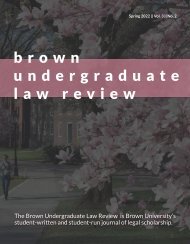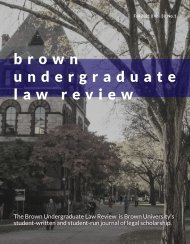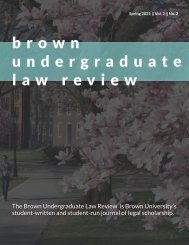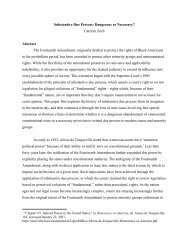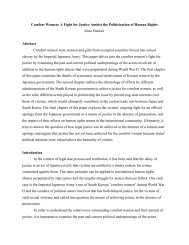From Frontiero to the Air Force: Citizenship and Equal Protection in U.S. Reproduction Jurisprudence
Olivia Siemens '21
Olivia Siemens '21
Create successful ePaper yourself
Turn your PDF publications into a flip-book with our unique Google optimized e-Paper software.
preemptive vasectomy. Instead, by placing legal restrictions squarely upon the female partner,
the state exerts a legal burden that bears no relation to a woman’s individual responsibility and
every relation to the accident of her birth.
Much in the same way that sex-based stereotyping promotes invidious discrimination “so
unjustifiable as to be violative of due process,” so too do restrictive abortion laws—a clear form
of sex discrimination—perpetuate inequalities that themselves violate women’s procedural
rights. 37 Ely’s representation-reinforcing method prohibits the government from “unduly
constricting” the participatory rights of minorities based on their minority status.
In theory, laws that restrict access to abortion classify the autonomy of a pregnant woman
as qualitatively different from that of her male sexual partner. In practice, these laws make each
woman’s equal citizenship contingent on her pregnancy status. Just as the Illinois legislature’s
decision to bar women from the legal profession worked to relegate women to the “domestic
sphere” (see Bradwell), contemporary abortion laws—which impose upon women, but not men,
the consequences of unplanned parenthood—function to strip them of the otherwise
presumptively equal citizenship status shared by other members of a democratic republic. 38
Justice Ruth Bader Ginsburg argues as much in her dissent in the 2007 Gonzales v. Carhart case,
in which the Court’s 5–4 conservative majority upheld the federal government’s Partial-Birth
Abortion Act of 2003:
Women, it is now acknowledged, have the talent, capacity, and right ‘to
participate equally in the economic and social life of the Nation.’ Their ability to
realize their full potential, the Court recognized, is intimately connected to ‘their
ability to control their reproductive lives.’ Thus, legal challenges to undue
restrictions on abortion procedures do not seek to vindicate some generalized
notion of privacy; rather, they center on a woman’s autonomy to determine her
life’s course, and thus to enjoy equal citizenship stature. 39
Ginsburg’s Gonzales dissent highlights not only the substantive inequality of abortion
restrictions but also the innate participational stakes of female reproductive autonomy. A
woman must embrace the fact that her “autonomy to determine her life’s course,” as Ginsburg
writes, could be diminished at any moment—during a momentary lapse of judgment, a birth
control defect, or a nonconsensual sexual encounter. While a male citizen may engage in
37
Ibid.
38
Bradwell, 83 U.S. 130.
39
Gonzales v. Carhart, 550 U.S. 124 (2007).
12




